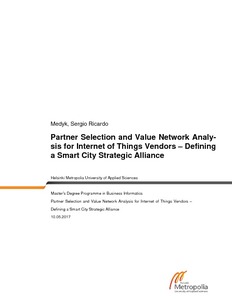Partner Selection and Value Network Analysis for Internet of Things Vendors – Defining a Smart City Strategic Alliance
Medyk, Sergio (2017)
Medyk, Sergio
Metropolia Ammattikorkeakoulu
2017
All rights reserved
Julkaisun pysyvä osoite on
https://urn.fi/URN:NBN:fi:amk-201705107347
https://urn.fi/URN:NBN:fi:amk-201705107347
Tiivistelmä
The objective of this research was to identify Internet of Things (IoT) use cases related to Smart Cites in the City of Helsinki, select appropriate Internet of Things partners from the different areas involving an IoT implementation and create a value network analysis in the scope of Smart Kalasatama area in Helsinki, Finland. The research output should support the target organization in developing similar partner network in other Smart City scenarios.
The study was conducted through a series of literature reviews including available Internet of Things business models and technologies, Smart Cities concepts and their needs for Internet of Things use cases, Partner Selection methods and Value Network Analysis methods. The purpose of the literature review was to draft the current state analysis and provide scientific grounding for developing the conceptual framework of this Master Thesis.
Following the conceptual framework, an empirical part is initiated including two phases. The first phase included choosing Internet of Things partners that are developing use cases in the different areas such as hardware sensors and actuators, Internet of Things gateways, software platform for Internet of Things device management and Internet of Things applications. The chosen partners are analyzed through the partner selection criteria defined in the conceptual framework. In the second phase, a network value analysis was performed so that a value network map was created as the result.
The feedback from the stakeholders involved in the partner business and Internet of Things area in the target organization was given so that to refine the selection criteria and the value network development. The result contributes in creating future strategic alliances for the target organization business development in Smart Cities.
In conclusion, this research aimed at producing a consistent and tested partner evaluation and selection framework for Internet of Things vendors, as well as an analysis for potential vendors within a value network context. The outcome was to ensure that the target organization will be strategically positioned in the Smart City market.
The study was conducted through a series of literature reviews including available Internet of Things business models and technologies, Smart Cities concepts and their needs for Internet of Things use cases, Partner Selection methods and Value Network Analysis methods. The purpose of the literature review was to draft the current state analysis and provide scientific grounding for developing the conceptual framework of this Master Thesis.
Following the conceptual framework, an empirical part is initiated including two phases. The first phase included choosing Internet of Things partners that are developing use cases in the different areas such as hardware sensors and actuators, Internet of Things gateways, software platform for Internet of Things device management and Internet of Things applications. The chosen partners are analyzed through the partner selection criteria defined in the conceptual framework. In the second phase, a network value analysis was performed so that a value network map was created as the result.
The feedback from the stakeholders involved in the partner business and Internet of Things area in the target organization was given so that to refine the selection criteria and the value network development. The result contributes in creating future strategic alliances for the target organization business development in Smart Cities.
In conclusion, this research aimed at producing a consistent and tested partner evaluation and selection framework for Internet of Things vendors, as well as an analysis for potential vendors within a value network context. The outcome was to ensure that the target organization will be strategically positioned in the Smart City market.
